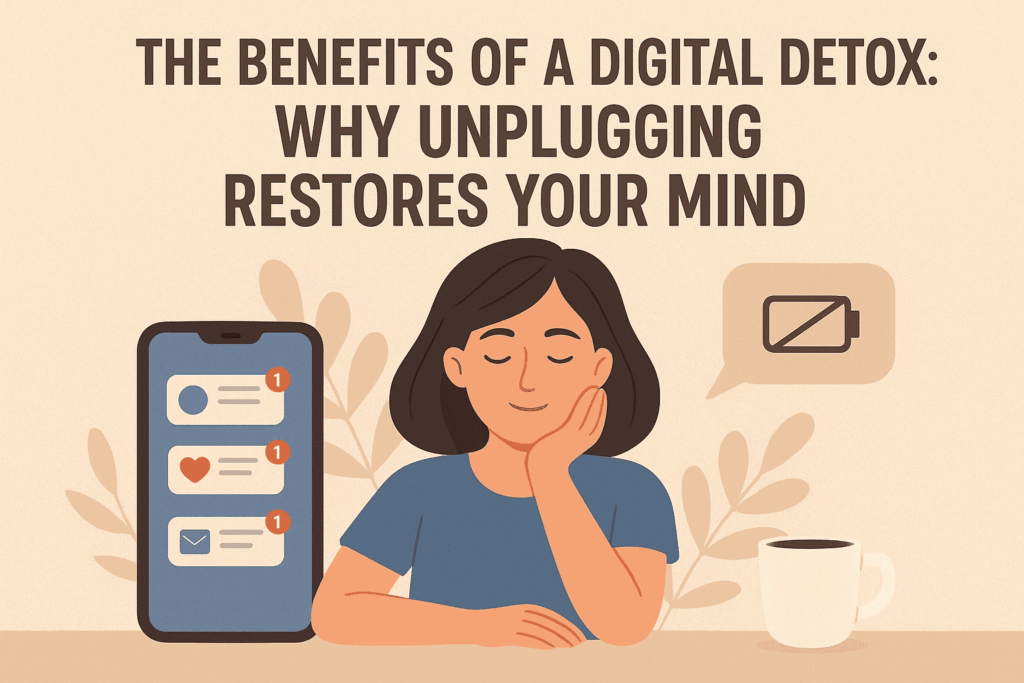
Your phone buzzes. You check it. Three minutes later, it buzzes again. You check it again. Sound familiar? You’re caught in a cycle that millions of people experience every single day. The average person checks their phone 96 times daily – that’s once every 10 minutes during waking hours.
This constant connectivity comes with a hidden cost. Your brain wasn’t designed to process the endless stream of notifications, updates, and digital stimulation that modern technology provides. Taking a break from screens and devices – what experts call a digital detox – offers your mind the chance to reset and recover.
What Happens to Your Brain on Digital Overload
Think about the last time you sat quietly without reaching for your phone. Can’t remember? You’re not alone. Our devices create a state of continuous partial attention, where your brain never fully focuses on one task.
Research shows that heavy screen time changes your brain structure. The prefrontal cortex – responsible for decision-making and impulse control – becomes less active. Meanwhile, the brain’s reward centers light up each time you receive a notification, creating patterns similar to those seen in gambling addiction.
Your attention span suffers too. Studies reveal that the average human attention span has dropped from 12 seconds in 2000 to just 8 seconds today. That’s shorter than a goldfish’s 9-second attention span.

The Mental Health Connection
Digital overwhelm affects your emotional well-being in measurable ways. Social media platforms designed to capture your attention trigger comparison and anxiety. Constant news updates flood your system with stress hormones. Late-night screen time disrupts sleep patterns, leaving you tired and irritable.
Young adults who spend more than three hours daily on social media show twice the risk of depression and anxiety symptoms. The blue light from screens interferes with melatonin production, making it harder to fall asleep and stay asleep. Poor sleep quality then affects mood, memory, and cognitive performance the next day.
Physical Benefits You’ll Notice
Stepping away from screens provides immediate physical relief. Your eyes get a break from strain and dryness. Neck and shoulder tension from looking down at devices begins to ease. Better sleep quality means your body has time to repair and restore itself.
Many people report fewer headaches after reducing screen time. Eye strain headaches are particularly common among heavy device users. When you spend less time hunched over a phone or laptop, your posture improves, reducing back and neck pain.
Improved Focus and Productivity
Without constant digital interruptions, your ability to concentrate returns. Deep work becomes possible again. You can read an entire article, complete a project, or have a full conversation without feeling the urge to check your phone.
Research indicates that it takes an average of 23 minutes and 15 seconds to fully refocus after a digital interruption. Every notification pulls you away from meaningful work. During a digital detox, your brain relearns how to sustain attention on single tasks.
Better Relationships and Social Connection
Real conversations improve when phones stay tucked away. You make eye contact, listen actively, and engage fully with the people around you. Children particularly benefit when parents put devices aside during family time.
Studies show that the mere presence of a phone on the table reduces conversation quality, even when it’s turned off. People share less personal information and report feeling less connected to their conversation partners when devices are visible.
Creativity and Problem-Solving Returns
Boredom breeds creativity. When your brain isn’t constantly fed digital content, it starts generating its own ideas. Many breakthrough insights happen during quiet moments – in the shower, on walks, or during other screen-free activities.
The default mode network in your brain becomes more active during rest periods. This network connects different brain regions and helps process experiences, solve problems, and generate creative ideas. Constant digital stimulation prevents this network from functioning properly.
How to Start Your Digital Detox
Begin with small steps. Choose specific times to put devices away – during meals, the hour before bed, or the first hour after waking up. Create phone-free zones in your bedroom or dining room.
Replace digital habits with analog alternatives. Read physical books, play board games, take walks without earbuds, or practice a musical instrument. The key is filling the time with activities that engage different parts of your brain.
Consider a weekend digital sabbath. From Friday evening to Sunday morning, keep devices turned off except for true emergencies. Use this time to reconnect with hobbies, people, and activities that bring genuine satisfaction.
Making It Sustainable
Start with what feels manageable. If a full day seems impossible, try two hours. Gradually increase the duration as it becomes more comfortable. Tell friends and family about your plans so they understand why you might not respond immediately to messages.
Remove tempting apps from your home screen. Turn off non-essential notifications. Use airplane mode instead of powering down completely – this way, you can still use your phone as a camera or alarm clock without internet access.
Track how you feel during and after screen-free periods. Notice improvements in sleep, mood, relationships, and productivity. These positive changes will motivate you to continue the practice.
The Long-Term Impact
Regular digital detoxes create lasting benefits. Your brain develops stronger focus abilities. Anxiety levels decrease. Sleep quality improves. Relationships deepen. Creativity flourishes.
You don’t need to abandon technology completely. The goal is finding balance and using devices intentionally rather than compulsively. When you return to your digital life after a break, you’ll likely find yourself more selective about what deserves your attention.
Your mind craves the restoration that comes from unplugging. In our hyperconnected world, choosing to disconnect becomes an act of self-care. Give your brain the gift of silence, and watch as clarity, peace, and focus naturally return.
You may also be interested in:
1. 12 Ways to Live a Spiritual Life & Grow Spiritually
2. Download Calming and Relaxing Music For Meditation, Sleep, Focus & More
3. Pros and Cons of Yoga [8 Advantages & 5 Disadvantages]

